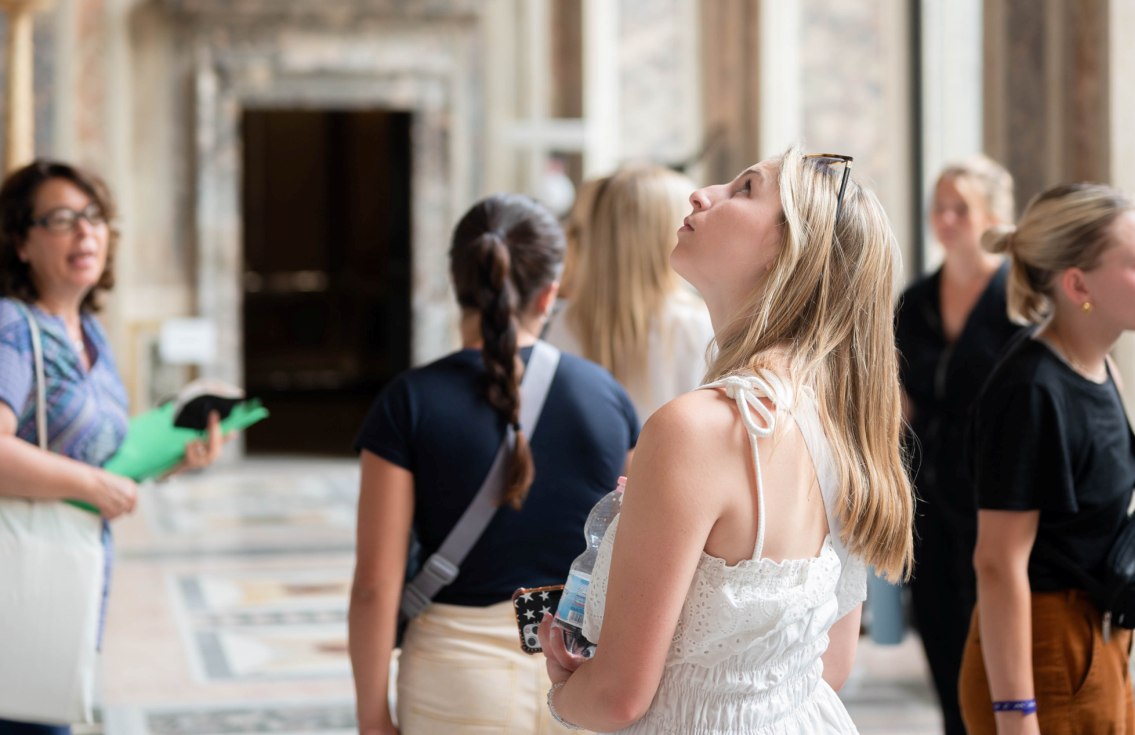
The study of Greek and Roman civilization helps develop strong analytical skills that enrich a wide range of academic fields, from political science and international affairs to history, literature, and the arts.
Rome offers students the ideal location for studying Classical Studies. The ancient Roman world is still present in the city’s monuments, artwork, and inscriptions, in its rich museum collections, and in the profound influence of the classical tradition on its contemporary architecture. In this setting, our courses explore not only ancient Roman, but also ancient Greek society, history, literature, philosophy, religion, mythology, archaeology, art, and architecture.
Classical Studies students learn to analyze major historical, cultural, philological, and artistic developments in the classical world, and to interpret different kinds of sources, from poetry and art to political tracts and architecture, in these contexts. They apply methods, knowledge, and theories from various disciplines, and develop their ability to think and communicate analytically and rigorously. This knowledge and these skills complement their studies in other fields, such as communications, political science, and international affairs, as well as other humanities fields like art history, history, and English literature.
Six courses including:
Of these courses, at least three must be at the 200 or 300 level.
The minor should seek to chart a coherent path through the courses related to Classical Studies. It should engage either with the breadth of the academic field or with an ‘area concentration’ within it. It is highly recommended that the student consults with Faculty Advisors in the Department of History and Humanities for guidance on direction, content, and opportunities of the minor.
Courses can be chosen from the following list. Other relevant courses may be agreed upon with the student’s faculty advisor.
AH 141 Introduction to the Visual Cultures of the Ancient World – OR – AH 151 Foundations in Ancient Art
AH 190 Cities, Towns, and Villas: Rome, Ostia, Pompeii
AH 220 Ancient Greek Art and Architecture
AH 221 The Etruscans and their Neighbors: The Art and Archaeology of Pre-Roman Italy
AH 223 The Art and Architecture of Imperial Rome
AH 225 The Archaeology of the Athenian Acropolis
AH 228 Persian and the Near East: Issues and Approaches
AH 243 Keeping the Dead Alive: Roman Funerary Art and Architecture in Context
AH 281/381 Independent Study (focused on the ancient world)
AH 290 Ancient Rome and Its Monuments
AH 354 Ancient Roman Portraiture
AH 364 Pagans, Jews, and Christians: Art and Religion in Late Antique Rome
AH/CL 222 Perception of Space: Wall-painting in the Ancient Mediterranean
AH/CL 266 Special Topics in Ancient Art
AH/CL 352 Rome in the Age of Augustus
AH/CL 366 Special Topics in Ancient Art
ARCH 201 Archaeological Theory and Methods
ARCH 202 Archaeological Excavation and Methodology
ARCH 203 Material Culture Studies and Archaeology
ARCH 204 Technology of The Ancient World: Aqueducts, Armor, Automata
ARCH 210 Bioarchaeology: Human Remains
ARCH/CL 101 The Archaeology of the Ancient Mediterranean World
ARCH/NS 310 Environmental Archaeology and Paleoclimatology
CL/HS 221 Introduction to the History of Ancient Greece
CL/HS 231 Introduction to the History of Ancient Rome
CL/HS 251 The Women who Built Rome
CL/HS 255 Peoples of the Roman World: Ethnic, Social and Cultural Identities
CL/HS 285 Wine and the Culture of Drinking in Classical Antiquity
CL/HS 299 Special Topics in Classical Studies and History
CL/HS 399 Special Topics in Classical Studies and History
HS 281/381 Independent Study (focused on the ancient world)
GRK 101 Elementary Greek I
GRK 102 Elementary Greek II
GRK 282 Directed Readings in Greek
LAT 101 Elementary Latin I
LAT 102 Elementary Latin II
LAT 103 Intensive Elementary Latin
LAT 282 Directed Readings in Latin
CL 260 Classical Mythology
CL 268 Literature and Society in Ancient Greece
CL 278 Literature and Society in Ancient Rome
CL 361 Sexuality, Eroticism, and Gender in Myth and Literature of Greece and Rome
CL/LAW 362 Roman Law
CL/RH 372 Classical Rhetoric and Oratory
CL/RL 288 Religion in the Graeco-Roman World
PH 210 Ancient Philosophy
PH/PL 311 Greek and Roman Political Philosophy
CL 281/381 Independent Study
CL 290 Ancient Eats: Food in Ancient Rome
CL 299 Special Topics in Classical Studies
CL 399 Special Topics in Classical Studies
Six courses, which include:





